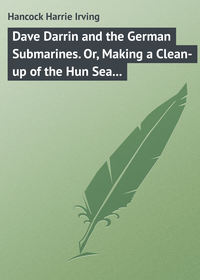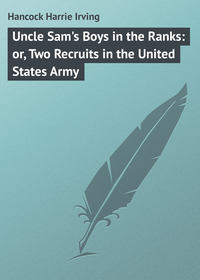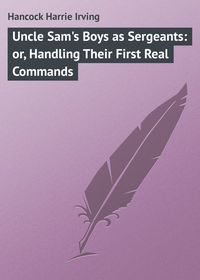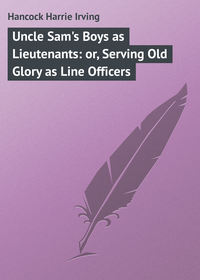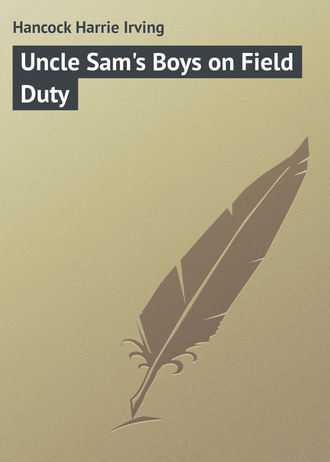 полная версия
полная версияUncle Sam's Boys on Field Duty
Captain Cortland uttered a low-voiced, triumphant exclamation.
At a motion from the clerk Dr. McKenzie started around toward the pen to be sworn.
Policeman Johnson, his face violently red, whispered a few words in the ear of the physician as the latter passed.
"Now, don't bother me with your talk," retorted the physician in a rather loud voice, and Johnson drew back.
"What did that policeman say to you?" demanded the magistrate as soon as the medical man had been sworn.
"He told me to look out what I said, or I'd get myself in big trouble down in the district," replied Dr. McKenzie promptly.
"I never – " began Johnson, his face paling.
"Put that policeman under arrest!" thundered the magistrate.
A court officer moved over and stood beside the now much-disturbed Johnson.
Dr. McKenzie testified to the serious condition in which he had found Lizzie McAndrew this morning. He was not permitted to repeat any of the young woman's statements in her own words, but was allowed to state the gist of what Miss McAndrew had said.
"May I interrupt the court long enough to ask if there is not now enough evidence to warrant postponing this hearing for a few days?" inquired Captain Cortland.
"I won't do it," replied Judge Guffey bluntly. "Plainly enough this has been one of the court's foolish mornings. I am now convinced that the testimony on which I had sentenced these two young soldiers was false evidence. Corporals Overton and Terry are discharged from custody."
Hal and Noll were about to step from the pen to join their captain when the magistrate interrupted:
"To you young military gentlemen I wish to offer the court's apology. I apologize, also, in the name of the State of Colorado and of the city of Denver. There is no calling more honorable than that of the soldier, who offers his comfort, his life and his blood for his country at need. The soldier who forgets the high nature of his calling and descends to rowdyism cannot be too severely punished, but the soldier who lives up to the high traditions of his calling cannot be too well commended. Policeman Johnson, step forward. Bear in mind that you are still under oath. In what work or business are Dabner and his friend engaged?"
"Why, your honor, I – I – "
"Have they any regular calling that you ever heard of?"
"Your honor, I don't know," stammered the policeman.
"Isn't it true that this precious pair seldom work?" pressed the magistrate.
"I – I'm afraid, your honor – "
"Policeman Johnson, go to the complaint clerk and swear to two short complaints charging Dabner and his estimable friend with vagrancy."
Johnson changed color swiftly three or four times, but he went in a daze to carry out his instructions.
As for Bill Dabner and his friend, they looked as though they were seeing ghosts. They did not attempt to speak until they were ordered to step into the pen and be sworn.
Then Policeman Johnson was called to the stand. Reluctantly he testified that the new prisoners were well known to be loafers, making a living mainly by their wits.
Dabner and his friend were then asked to testify in their own behalf, but they were too badly overwhelmed to be able to say much.
"Prisoners," said Judge Guffey, gazing at them in sheer disgust, "it would give me great pleasure to bind you over for the grand jury on charges of perjury committed this morning. But I feel disinclined to take any action that may drag these young soldiers away from their own duties. Therefore, on the charge of vagrancy, I sentence you each to two years in the workhouse. Take those prisoners below at once."
Bill and his crony seemed barely able to walk when they were forced below.
"Policeman Johnson, come forward! Do you desire to offer any denial of the evidence concerning the charge that Dr. McKenzie made against you a few minutes ago!"
Johnson opened his mouth to speak, but under the stern gaze of the police magistrate he found it impossible to persist in his denial.
"Johnson, for attempting to intimidate a witness in this court I sentence you to thirty days' confinement at the workhouse. I shall also see to it that a full account of this matter reaches the chief of police. That is all."
Captain Cortland thanked the court heartily. Then, with his young soldier boys following, he made his way from the court room. Dr. McKenzie was at their heels when they reached open air, and a pleasant chat of a few moments followed.
"Men, I would have come to you much sooner than I did," explained Captain Cortland, "but an accident happened that couldn't be helped. Through some stupidity your messenger left your note over among the militiamen, and it did not reach me until this morning. Then I came as fast as I could travel."
The heartiest thanks of all three soldiers were extended to Dr. McKenzie, after which the Army party started back to camp.
Hal's adventures for the day, however, were by no means yet ended.
As the three entered the regulars' infantry camp, Captain Cortland caught sight of a horse being held before his tent by one of his infantry privates.
"I want to talk with you two a moment," remarked B Company's commander, "but I see that I have a visitor from the cavalry. Wait outside until I summon you."
The horse, a beautiful animal, very plainly belonged to the cavalry, for the saddle blanket and trappings were trimmed with yellow, which is the cavalry color.
"Had much work this morning, Claxton?" Hal asked of the private soldier who was holding the horse's bridle.
"We've been going some, Corporal," replied Claxton, with a smile. "And it was hot in the sun to-day, too."
"Even at that," observed Corporal Hal grimly, "I guess you had it easier here than we did."
"You've been in some trouble, Corporal?"
"Yes, but now it's – "
Corporal Hal Overton never finished that sentence. At that instant all three became aware of a great clatter up the field.
A pair of horses attached to a light victoria came racing down the field, passing close to the head of the infantry camp.
There was no driver on the seat; the reins were trailing at the heels of the runaways.
Nor did it take more than a glance to show that both of the runaways were now frightened past all hope of stopping them by any simple expedient.
Less than a quarter of a mile down the field two regular and two militia field batteries were drawn up in a long line, squarely in front of the path of the flying horses.
Worse still, the horses belonging to the batteries had been detached and sent to the rear. There were some four hundred artillerymen in all near the guns, but not one of them mounted in this period of instruction.
The horses seemed bound to dash in among the closely aligned field guns, wrecking the victoria and probably killing the woman and girl who now stood up in the vehicle screaming with terror, but seemingly too frightened to jump.
This Corporal Hal saw in his one swift glance, as the outfit went by like a whirlwind.
What he didn't see the soldier boy didn't even stop to guess.
"Let go, Claxton!" he shouted, snatching the bridle from the orderly's hand.
All in a twinkling Hal was up in saddle and urging the magnificent cavalry animal forward.
CHAPTER XXIV
CONCLUSION
SCORES of brave, quick-witted men in uniform were leaping forward to use their sweeping arms to divert the runaways. But Corporal Hal's swift glance forward as he bent over the neck of the cavalry horse and urged it forward showed that these soldiers could not possibly save the woman and girl in the victoria.
To whichever side the horses might be forced into dodging, the wild, snorting animals would still run over blocking soldiers and bring up in a confused tangle of wreckage among the guns.
"On – on with you!" roared Corporal Hal, beating the horse's flank with one hand and cudgeling with his heels.
That cavalry mount was a magnificent beast. Corporal Overton was quickly up alongside the victoria. Then he gained on the horses.
"Now, in close, you good old brute!" glowed Overton, though his lips were bloodless as he took the chance and threw the bridle over.
Bending sideways from the saddle, Corporal Hal reached the bridle of the nigh horse.
Now he hung on grimly to the bridle of the runaway, at the same time using his other arm to bring the splendidly trained cavalry horse back on its haunches.
That nigh runaway was checked, somewhat, but the pull threatened to drag Corporal Hal's left arm out of its socket.
Something had to give way!
Then, with a suppressed yell, Overton felt himself being torn from saddle.
He held on. The runaways tried to forge ahead at renewed speed, but the determined doughboy soldier, holding still to the bridle of one of the animals, put a big check on the speed of the runaways.
A few yards further they dashed, then slowed. Now a score of artillerymen, regular and militia, sprang in and seized the animals just as Corporal Hal Overton, his uniform torn and dust-grimed, and he himself bleeding, fell in the dust.
But the runaways were stopped, and other soldiers assisted the woman and her fourteen-year-old daughter in safety to the ground.
Back of them all the fine cavalry horse stood trembling and curious. This cavalry horse, struck by the wheels of the victoria, now showed blood spots along his glistening, lathered flanks.
"Get up, messmate," called one of the regular artillerymen, bending over Overton. "You did the whole trick like an Army man, and the ladies want to thank you."
He helped Hal to his feet. The soldier boy trembled slightly and almost unconsciously put a hand to his head.
"Your hat, mate? We'll help you find that."
But Hal's hand had gone to a cut on his head from which blood was oozing, for just as he went down one of the horses had struck him a glancing kick there.
It was Corporal Noll Terry, who sprinting desperately along the field, espied his chum's campaign hat and picked it up with hardly a slackening of his speed.
But Noll did run more slowly when he saw Overton again standing on his feet. Now Noll gently approached the cavalry horse, whose bridle reins dangled.
"Easy now, boy," urged Noll as he approached and reached for the lines.
He secured them, then gently led the cavalry mount over toward the crowd.
"Hurt much, Hal?" hailed Noll
"No; nothing worth talking about."
A soldier had said something about the woman and the girl wishing to thank Corporal Hal, but that man had spoken without looking, for now the woman lay on the grass in a dead faint, while the girl bent over her.
"Noll," spoke Corporal Overton, "at last accounts I believe we were supposed to be standing in front of Captain Cortland's tent, awaiting his summons. I guess we'd better be hurrying back to get on our job."
Noll led the horse at first. By and by Hal reached over and secured the bridle, pausing just an instant to stroke the animal's neck.
"You're a fine old fellow," Hal murmured, gazing wistfully at the horse.
"Let's keep right on back," urged Noll. "Remember, we're here really against orders."
Neither soldier boy thought of mounting the animal for a ride back. No need existing, either would have thought it a big piece of impudence to mount an officer's horse unbidden.
Captain Cortland was standing before the door of his tent, watching the approach of his soldier boys. Beside Cortland stood another officer, down the outer side of whose trousers' legs ran the broad, yellow stripe of the cavalry. This gentleman was Captain Ellis.
"We're in for it, I reckon," muttered Corporal Hal to his chum as they drew nearer to Cortland's tent. "Leaving when under orders, and taking an officer's horse, at that. Well, here's for our medicine!"
Both soldier boys stepped forward holding themselves as erect as ever, just the same.
Then, halting before the captain's tent, they came very formally to the salute.
"Captain Cortland, I am obliged to report, sir, that I left here when under orders. I have also to report that, seeing the danger of a serious accident to others, I had the impudence to impress an officer's horse. Unfortunately, sir, that animal now appears to be injured."
"I have also, sir, to report leaving in the face of other orders," Noll Terry stated gravely.
"In view of the reasons that lay behind your acts," replied Captain Cortland, with only the faintest twinkle of a smile, "I think we shall have to conclude that discipline has not suffered a serious affront this time."
"I am very sorry, indeed, sir, that I rode your fine animal to any injury," continued Corporal Hal, turning and saluting the cavalry captain.
"Pooh!" scoffed Captain Ellis, stepping to one side and surveying the cuts on his mount's flank. "Nothing but a few scratches, Corporal – and a whole horse is as nothing compared with human lives. We got out in time to see your handsome work, Corporal, and all I'm sorry for is that we haven't you in the cavalry."
"Thank you, sir."
"You can't have these non-coms. of mine for yellow-legs, Ellis," laughed Captain Cortland. "You have just seen what a fine pair of young soldiers they are. I intend to keep them right here in B Company."
"You always were a selfish fellow, Cortland," laughed Captain Ellis.
"You are hurt, are you not, Corporal?" queried Captain Cortland, turning to Hal Overton.
"Nothing but a little scratch and a lump on my head, sir. I had forgotten it until you asked."
"Go over to hospital tent, Corporal Overton, and have your head dressed. Corporal Terry, you may go with your friend if you wish."
As the two young corporals saluted and turned away, Captain Cortland stood gazing after them for a few moments, while Private Claxton walked the horse up and down.
"Ellis, you don't often find such a snappy, all-around good pair of young soldiers, do you?" asked B Company's commander.
"Oh, I don't know," replied Captain Ellis. "I have a few like them in my troop, I guess."
"My dear fellow, I'm from Missouri," laughed Captain Cortland.
We would gladly carry the present narrative further, but here the present tale is obliged to end, for there were no other developments of an interesting nature while the encampment with the Colorado National Guard continued. This period was filled with nothing beyond the ordinary routine of camp instruction life, and when it was all over Major Silsbee's battalion of the Thirty-fourth gladly enough returned to Fort Clowdry.
Our gallant soldier boys will be a little older when next we meet them, as we shall do in the next volume in this series, which will be published under the title, "Uncle Sam's Boys as Sergeants; Or, Handling Their First Real Commands." In this coming volume we shall see to just what extent they made good as non-coms., and whether, in the broader sense, they proved themselves the all-around soldiers that their conduct up to date has seemed to assure. In the next volume will be described much of both the work and the play that fall to the regular Army soldier's lot, and many rousing adventures and ludicrous happenings will therein be told.
The End

